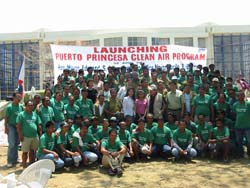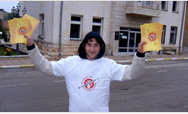You are here » Home » Telling Our Story
Case Study
Program reduces air
pollution and empowers
drivers
Improving Air Quality and Livelihoods

| |
Photo: Bobby Ocampo, Puerto Princesa City
|
|
Tricycle drivers support the clean
air program in Puerto Princesa,
Philippines.
Drivers say they are
performing more regular
engine maintenance,
resulting in significantly
reduced emissions.
|
Challenge
Puerto Princesa, capital of the Philippine island province of Palawan, is a city of enormous natural beauty, including crystalline seas, lush mountains and a largely unspoiled coastline. It is also a city with an air pollution problem, much of it caused by the omnipresent three-wheeled taxis (“tricycles”) and their two-stroke engines belching exhaust that contains high level of fine particles and other harmful pollutants. City leaders and citizens alike want to clean up the air and develop a sustainable tourism industry without causing economic hardship for the roughly 4,000 tricycle operators; Puerto Princesa’s poverty rate is 70 percent and many people depend on tricycles for their livelihoods.
Initiative
USAID helped create an initiative that partners tricycle drivers, youth groups and local leaders to work to reduce air pollution. With support from USAID, motorcycle manufacturers conducted maintenance workshops for each of the 20 tricycle driver associations. USAID helped drivers access low-cost loans so they could upgrade to cleaner engines and conducted an information campaign on the adverse health effects of polluting engines on drivers and their passengers. Tricycle drivers have embraced the clean air program, formed a cooperative and are working with the municipality on a new traffic management system that limits the number of tricycles on the road.
Results
Four months into the program, tricycle emissions had been significantly reduced: hydrocarbons by 40 percent and carbon monoxide by 30 percent. Drivers say they are performing more regular engine maintenance, including properly tuning engines and using oil correctly. Under the new traffic management sys-tem, drivers work half as many hours, but earn the same income and said they used the extra time to find additional work and spend time with their families.
Print-friendly version of this page (244kb - PDF)
Click here for high-res photo
Back to Top ^ | 

